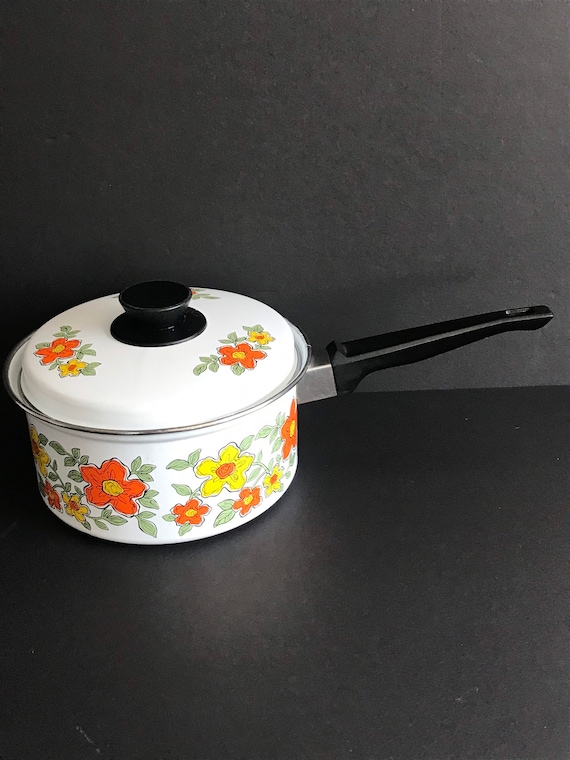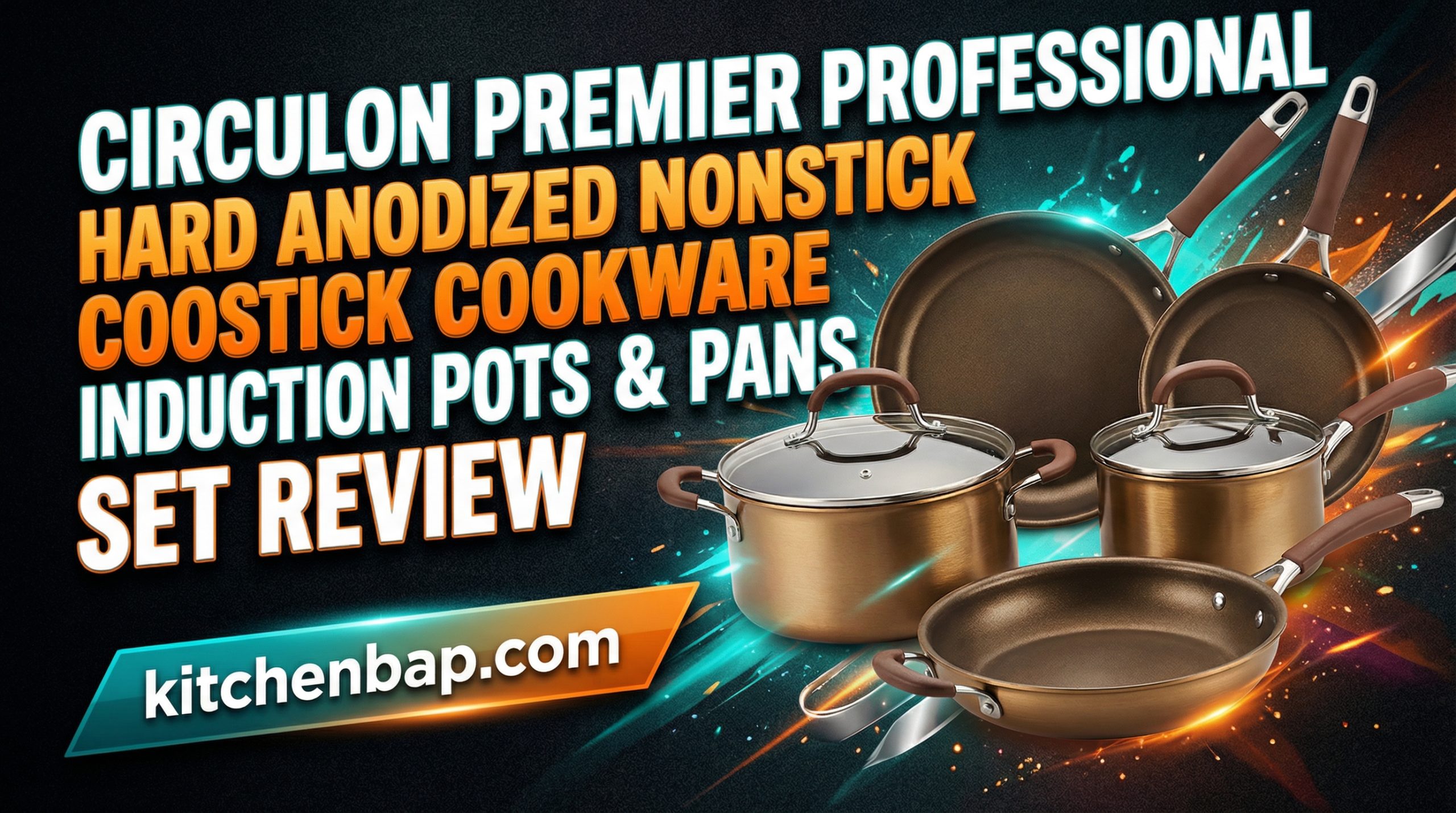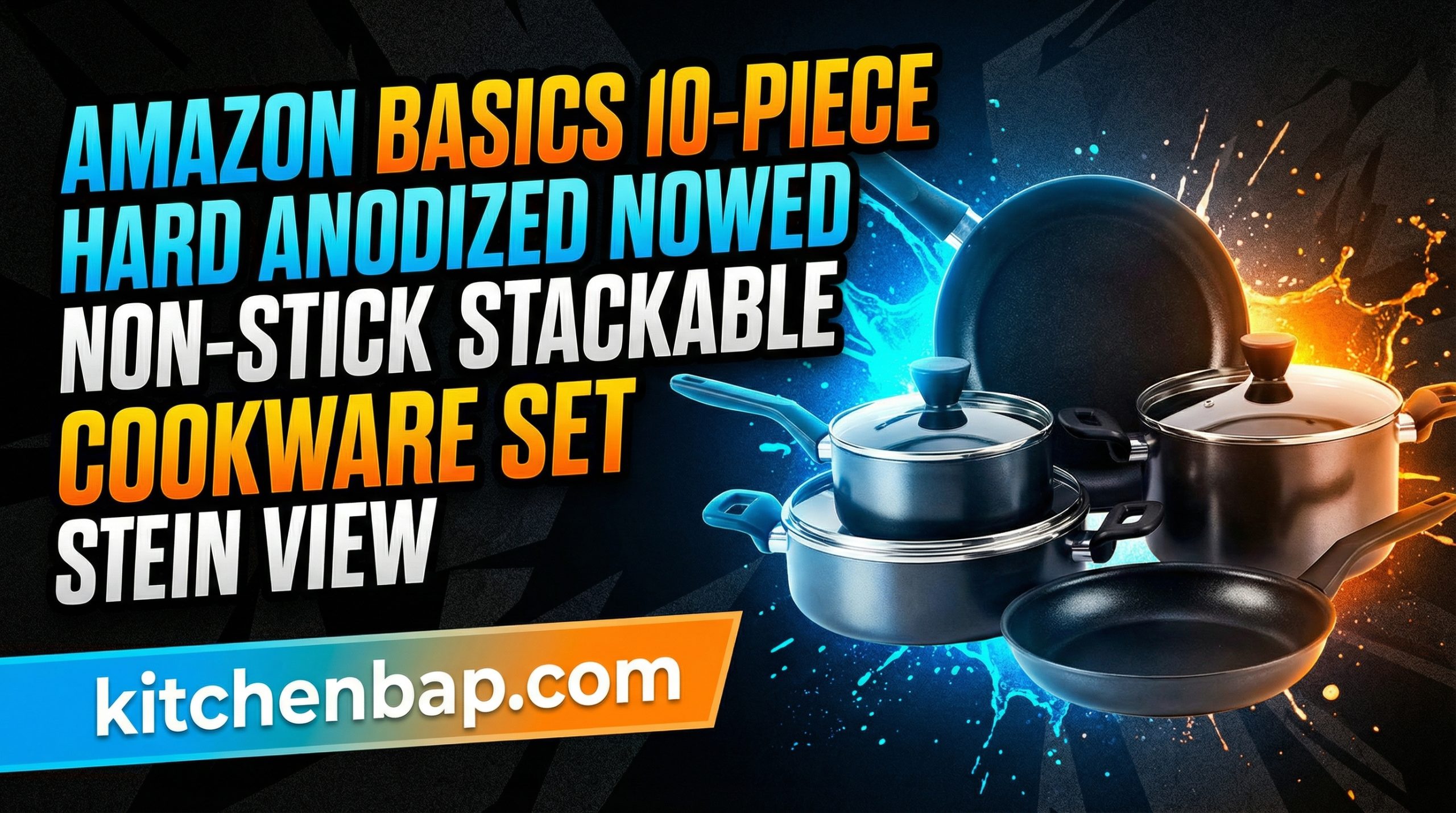Vintage enamelware cookware is both beautiful and functional. It brings a touch of nostalgia to modern kitchens.
This cookware features a unique blend of metal and enamel, making it sturdy and charming. Many people love vintage enamelware for its colorful designs and durability. It can withstand high temperatures, making it perfect for various cooking tasks. This cookware is often lightweight and easy to clean.
Plus, it adds character to any kitchen. Whether you are a seasoned chef or a home cook, vintage enamelware can enhance your cooking experience. In this blog post, we will explore the history, benefits, and different types of vintage enamelware cookware. Get ready to discover why this timeless kitchen essential deserves a place in your home.
The Allure Of Vintage Enamelware
Vintage enamelware cookware holds a special charm. Its beauty and history attract many. Each piece tells a story. This cookware combines function with artistic design. It brings warmth to any kitchen.
Aesthetic Appeal
Vintage enamelware shines with vibrant colors and unique patterns. Many pieces feature lovely floral designs and bright hues. They stand out in modern kitchens. The glossy finish adds a touch of elegance.
- Variety of Colors: Red, blue, green, and white are popular.
- Unique Patterns: Each piece has its own design.
- Eye-Catching: Perfect for display or everyday use.
These pieces mix well with other styles. They add character to rustic or modern decor. A vintage piece can be a conversation starter. Its charm draws people in. It makes cooking feel special.
Nostalgia
Using vintage enamelware brings back memories. Many people recall family gatherings. They remember meals cooked in these colorful pots. Each piece evokes a sense of comfort.
- Grandparents cooking family recipes.
- Summer picnics with colorful dishes.
- Holiday meals shared with loved ones.
This nostalgia creates a connection to the past. Each meal cooked in vintage enamelware feels more meaningful. It reminds us of simpler times. The stories behind each piece live on.
Durability And Longevity
Vintage enamelware is known for its strength. Made from metal coated with enamel, it resists scratches and stains. These pieces can last for decades.
| Feature | Benefit |
|---|---|
| Scratch Resistant | Stays beautiful over time. |
| Heat Resistant | Safe for stovetops and ovens. |
| Easy to Clean | Maintains a fresh look with little effort. |
This durability makes vintage enamelware a practical choice. It can handle daily use. Many people cherish these pieces for generations.
Historical Significance Of Enamelware
Enamelware holds a special place in cooking history. Its unique blend of beauty and practicality made it a staple in many households. Understanding its origins and evolution reveals its lasting impact on kitchen culture.
Origins And Evolution
The story of enamelware begins in the late 18th century. Craftsmen discovered a way to fuse glass onto metal. This process created a hard, durable surface. Enamelware quickly gained attention for its vibrant colors and easy cleaning.
By the 19th century, enamelware production expanded. Factories began mass-producing pots, pans, and dishes. This made enamelware accessible to more people. It became popular among homemakers for its affordability and style.
Today, vintage enamelware is admired for its charm. Collectors cherish its rich history and unique designs.
Popularity In Various Eras
Enamelware saw varying popularity through the decades:
| Era | Characteristics | Significance |
|---|---|---|
| 19th Century | Mass production began; vibrant colors | Made cooking accessible for many |
| Early 20th Century | Functional designs; durable materials | Essential for everyday cooking |
| Mid 20th Century | Trendy in homes; bright pastels | Symbol of modern domestic life |
| Present Day | Vintage appeal; sustainable choice | Reclaimed and cherished by collectors |
Throughout these eras, enamelware reflected social changes. It adapted to the needs of families. Today, it remains a beloved item in kitchens worldwide.
Its historical significance lies in its blend of functionality and style. Enamelware continues to inspire cooks and collectors alike.
Identifying Authentic Enamelware
Collecting vintage enamelware is exciting. Knowing how to spot real pieces is important. Authentic enamelware has unique features. Recognizing these features helps you avoid fakes.
Marks Of Authenticity
Authentic enamelware often has specific marks. These marks can help you identify its age and brand. Here are some common marks to look for:
- Manufacturer’s Logo: Many brands have a unique logo.
- Country of Origin: Look for markings like “Made in France” or “Made in Germany.”
- Year of Production: Some pieces include a year of production.
Check the bottom of the piece for these marks. They can indicate quality and authenticity. Keep in mind that some vintage pieces may lack these marks. This does not necessarily mean they are not authentic.
Age And Condition Assessment
Age plays a big role in the value of enamelware. Here are tips to assess age and condition:
- Look for Wear: Signs of wear can indicate age.
- Check the Color: Older pieces often have faded colors.
- Inspect the Finish: Authentic pieces have a smooth, glossy finish.
Evaluate the overall condition. Minor chips can add character, but large cracks may lower value. Remember, the best pieces tell a story through their wear and age.
| Condition | Description | Value Impact |
|---|---|---|
| Mint | Like new, no signs of wear. | Highest value |
| Good | Minor wear, no major damage. | Moderate value |
| Fair | Visible wear, some chips or scratches. | Lower value |
| Poor | Significant damage, cracks or missing pieces. | Lowest value |
Use these tips to identify authentic enamelware. Collecting can be rewarding with the right knowledge.

Credit: www.stpgoods.com
Styles And Designs Through The Ages
Vintage enamelware cookware has a rich history. Each era brought unique styles and designs. These pieces are more than just tools. They tell stories of their time. Let’s explore classic patterns, colors, and iconic brands.
Classic Patterns And Colors
Enamelware comes in various patterns and colors. Some designs have stood the test of time. Here are some popular ones:
- Floral Patterns: Delicate flowers add charm.
- Striped Designs: Bold stripes create a lively look.
- Speckled Finishes: A rustic feel with unique textures.
- Solid Colors: Bright colors like red, blue, and green are timeless.
These patterns often reflect the culture of their time. For example, floral patterns were popular in the 1950s. Striped designs became trendy in the 1960s. Each piece carries a piece of history.
Iconic Manufacturers And Brands
Several manufacturers shaped enamelware’s legacy. Here are some notable brands:
| Brand | Founded | Notable Products |
|---|---|---|
| Granite Ware | 1871 | Cookware, baking dishes |
| Le Creuset | 1925 | Casseroles, pots |
| Emile Henry | 1850 | Pie dishes, baking pots |
| Weston | 1905 | Mixing bowls, cookware |
These brands created high-quality cookware. They combined functionality with beautiful designs. Collectors appreciate both style and durability. Vintage enamelware remains popular today.
Caring For Your Vintage Enamelware
Caring for your vintage enamelware is important. These pieces are not just tools. They are treasures from the past. Proper care ensures they last for years. Here are some tips to help you maintain their beauty and function.
Cleaning And Maintenance Tips
Keeping your vintage enamelware clean is simple. Follow these steps for best results:
- Use warm, soapy water.
- Use a soft sponge or cloth. Avoid steel wool.
- Rinse thoroughly to remove soap.
- Dry immediately to prevent rust.
Avoid using harsh chemicals. They can damage the enamel. Here are some extra tips:
| Tip | Description |
|---|---|
| Stains | For stubborn stains, use baking soda. Make a paste and scrub gently. |
| Storage | Store in a dry place. Stack carefully to avoid scratches. |
Restoration Advice For Collectors
Collectors may want to restore vintage enamelware. Here are some steps to follow:
- Assess the damage. Check for chips or cracks.
- Clean the piece thoroughly.
- Use enamel repair kits for small chips.
- For larger repairs, consider professional help.
Keep in mind that restoration can affect value. Always research before making changes. Enjoy your vintage enamelware with the right care and attention.

Credit: www.pinterest.com
The Role Of Enamelware In Modern Kitchens
Enamelware cookware has made a strong comeback in today’s kitchens. This vintage style blends nostalgia with practicality. Enamelware is not just pretty; it serves many purposes. It is durable, easy to clean, and adds character to any kitchen.
Blending Old With New
Modern kitchens often focus on sleek designs. Enamelware adds a touch of vintage charm. It fits well with contemporary decor. Here are some ways enamelware blends old with new:
- Available in various colors and patterns
- Mixes well with stainless steel and wood
- Great for rustic and minimalist styles
This cookware connects generations. Grandmothers used it, and now younger cooks do too. The charm of enamelware appeals to all ages.
Functionality Meets Fashion
Enamelware is not just attractive. It is also highly functional. Here are some features that make it useful:
| Feature | Benefit |
|---|---|
| Durability | Resists chipping and scratching |
| Easy to Clean | Non-stick surface, simple to wipe |
| Heat Retention | Even cooking, keeps food warm |
Many cooks choose enamelware for its style and function. It looks great on the stove or table. Whether for cooking or serving, it shines.
Collecting Vintage Enamelware
Collecting vintage enamelware is a fun and rewarding hobby. These colorful items add charm to any kitchen. Each piece tells a story. Finding the right piece can feel like a treasure hunt. Many love the nostalgia and history behind these beautiful items.
Starting A Collection
Begin your collection with a clear plan. Decide what type of enamelware you like. Consider these factors:
- Color: Bright colors stand out.
- Style: Look for classic or modern designs.
- Condition: Choose pieces in good shape.
Set a budget. Vintage enamelware can vary in price. Start small and grow your collection over time. Keep track of your purchases. This helps you remember what you have.
Finding Hidden Gems
Finding vintage enamelware can be exciting. Look in places like:
- Thrift stores
- Flea markets
- Estate sales
- Online marketplaces
Check for local antique shops. You may discover unique pieces there. Talk to sellers. They often know the history of the items.
Examine each piece carefully. Look for:
- Chips or cracks
- Rust spots
- Faded paint
Don’t rush. The thrill is in the hunt. Enjoy the process of finding special pieces for your collection.
The Future Of Enamelware In The Culinary World
Vintage enamelware cookware is making a strong comeback. This resurgence is driven by its charm and functionality. As more people embrace sustainable practices, enamelware stands out. Its durability and eco-friendly nature appeal to many home cooks. The future of enamelware looks bright.
Sustainable And Eco-friendly Practices
Enamelware is a great choice for those who care about the planet. It is made from natural materials. This makes it non-toxic and safe for cooking. Here are some reasons why enamelware is sustainable:
- Durability: Enamelware lasts for years. It reduces waste.
- Recyclable: At the end of its life, it can be recycled.
- No harmful chemicals: Enamelware is free from harmful substances.
- Energy-efficient: It heats evenly, saving energy.
Using enamelware also supports local artisans. Many vintage pieces are handmade. This craftsmanship is valuable and helps communities.
Revival And Innovation
The revival of enamelware is more than just nostalgia. Modern designers are finding new ways to use it. Here are some trends in enamelware:
- Colorful designs: Bright colors and patterns are popular.
- Multi-functional pieces: Cookware that serves many purposes.
- Collaboration with chefs: Chefs are creating limited-edition enamelware.
Innovative technology is also improving enamelware. Manufacturers are using better coatings. This makes enamelware more resistant to scratches and stains. As a result, its popularity is set to grow.
Vintage enamelware will continue to thrive in kitchens. It blends style with practicality. The future of enamelware in cooking looks promising.

Credit: www.etsy.com
Frequently Asked Questions
What Is Vintage Enamelware Cookware?
Vintage enamelware cookware is kitchenware made from metal coated with a layer of enamel. This type of cookware is often characterized by its colorful designs and durability. It has been popular since the late 19th century and is known for its ability to withstand high temperatures.
How To Care For Vintage Enamelware?
Caring for vintage enamelware involves gentle cleaning and avoiding harsh abrasives. Use mild soap and a soft sponge to clean the surface. Avoid soaking it for long periods to prevent chipping. Store it in a dry place to maintain its quality and appearance over time.
Is Vintage Enamelware Safe For Cooking?
Yes, vintage enamelware is generally safe for cooking. However, check for any signs of damage, such as chips or cracks, as these can affect safety. Ensure that the enamel coating is intact, as it prevents the metal underneath from reacting with food.
Use it with care to enjoy its benefits.
Where To Find Vintage Enamelware Cookware?
You can find vintage enamelware cookware at thrift stores, flea markets, and online marketplaces. Websites like eBay and Etsy often have a variety of options. Antique shops may also carry unique pieces. Always inspect items for quality and condition before purchasing to ensure you’re getting a good deal.
Conclusion
Vintage enamelware cookware brings charm and functionality to any kitchen. Its unique look adds a touch of nostalgia. These pieces are durable and easy to clean. Cooking with them connects you to the past. They work well for both everyday meals and special occasions.
Collecting vintage enamelware can be fun and rewarding. Each piece has its own story and history. Enjoy the beauty and practicality that vintage enamelware offers. It’s a wonderful way to enhance your cooking experience while honoring tradition. Choose enamelware for your kitchen, and enjoy its timeless appeal.





Leave a Reply